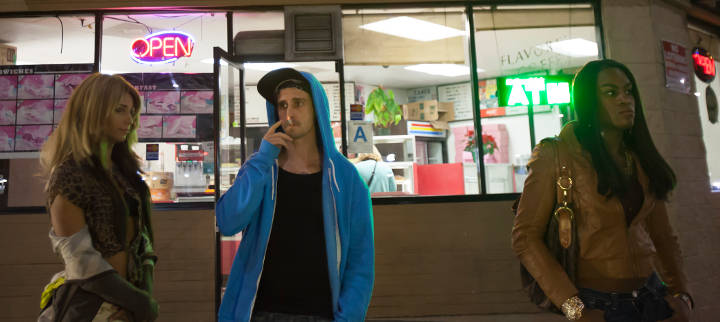
Look at any poster for a big budget film: the chances are you’ll find a critic insisting that it made them laugh and cry. You can find this statement even when the movie features Arnold Schwarzenegger or it’s the seventh in an already regrettable series. In reality, eliciting genuine emotion from someone who isn’t being paid to gush about a film is extremely difficult. Writing dialogue that’s funny and engaging is always challenging. It’s hard to create interesting characters who are deeply flawed anti-heroes yet somehow manage to win the audience’s sympathy. A film which provides actual moments of tears and laughter is one to be treasured and Tangerine goes several steps further. I can only recall a few films I’ve seen which hit as many targets as this one did – it was hilarious, heartbreaking and problematic in equal measure.
Tangerine managed to pluck at all my emotions whilst remaining consistently entertaining. The dialogue was offensive and uncompromising but entirely believable. It’s hard to say how much of it was scripted – it felt like it was all spontaneous – but the consistent stream of jokes and explosive arguments suggest that a large part of it was carefully orchestrated. Despite the technical limitations (the film was shot entirely on an iPhone 5) the cinematography paints a beautiful, sin-kissed yet crushingly bleak portrait of Los Angeles.
It’s Christmas eve and Sin-Dee Rella is a transgender sex worker who has just gotten out of prison. She attempts to step straight back into her old life but is enraged when she discovers that her boyfriend, a small-time pimp called Chester, has dumped her in favour of an unknown cis-woman. Sin-Dee storms off into the L.A. night vowing to track down Chester and his new girlfriend and settle the score with them both. At the same time, a lonely and unfulfilled taxi driver called Ramzik makes excuses to escape his family and drives to the strip where Sin-Dee and her friends usually walk. A regular customer of Sin-Dee’s, Ramzik hears she’s out of prison and goes looking for her, all the while trying to evade his mother-in-law’s attempts to expose his nighttime jaunts. Each character has a different agenda but their stories become intertwined and are bound to collide before the night is out.
The dialogue in this movie really crackles. Much of the drama grows out of tense, well-observed and often high-volume conversations that gradually reveal the complex nature of the main characters. Whilst Sin-Dee Rella herself is violent, unstable and narcissistic, the film shows a vulnerable and uncertain side to her; she becomes progressively more sympathetic as time goes on. It’s a curious experience to be brought so close to a character who is so unlikeable, but still be forced to feel for her and see the world through her eyes. The people who surround Sin-Dee are only marginally less obnoxious and filled with attitude - the scenes where arguments erupt are some of the most memorable. Considering the basic equipment the film was produced with, these scenes are amusing and impressive. Some my favorite moments were those in which multiple arguments were raging simultaneously. The sound was recorded and mixed so that the important lines stood out from the fracas happening all around. The effect was impressive but crucially it allowed for some great and inventive humor; an oddly measured kind of chaos reigned when the characters’ opposing worlds came crashing together.
The entire film and its perspective is grounded in the world of Sin-Dee and her friends. As a result, the movie projected a distinct attitude to gender and transphobia in particular – these themes were omnipresent but weren’t used simply to drive the narrative. Throughout the film, trans identity is presented as the norm - cis-gendered characters aren’t the prime focus and are often included as hapless victims of Sin-Dee’s explosive temper. Conservative and hateful characters only intrude in the story at key moments. An especially heartbreaking scene comes after Sin-Dee has been attacked and she is standing in the laundrette trying to clean herself up. It becomes clear that the wig she has worn for the entire film must be washed and she has no choice but to take it off in this open and public place. Doing so strips away all the confidence and aggression that have defined her up until this point, and exposes Sin-Dee’s vulnerability around her appearance and her identity. I found this moment both sweet and really upsetting. It felt like the film took the time to explore Sin-Dee’s mind-set, including her gender, rather than treating it at as the defining aspect of her character.
Tangerine is not easy or relaxing to watch and it’s certainly not perfect. That said, I regard a film very highly when it can make me laugh, make me care about characters I would normally want to avoid, and honestly upset me through their experiences. Tangerine might be a very different experience if you’re directly affected by the issues it engages with or you have real experience of the part of Los Angeles it’s set in. From my limited perspective at least, this film is essential viewing – a tragically funny movie which has profound and interesting things to say, and does it all on a minuscule budget.




